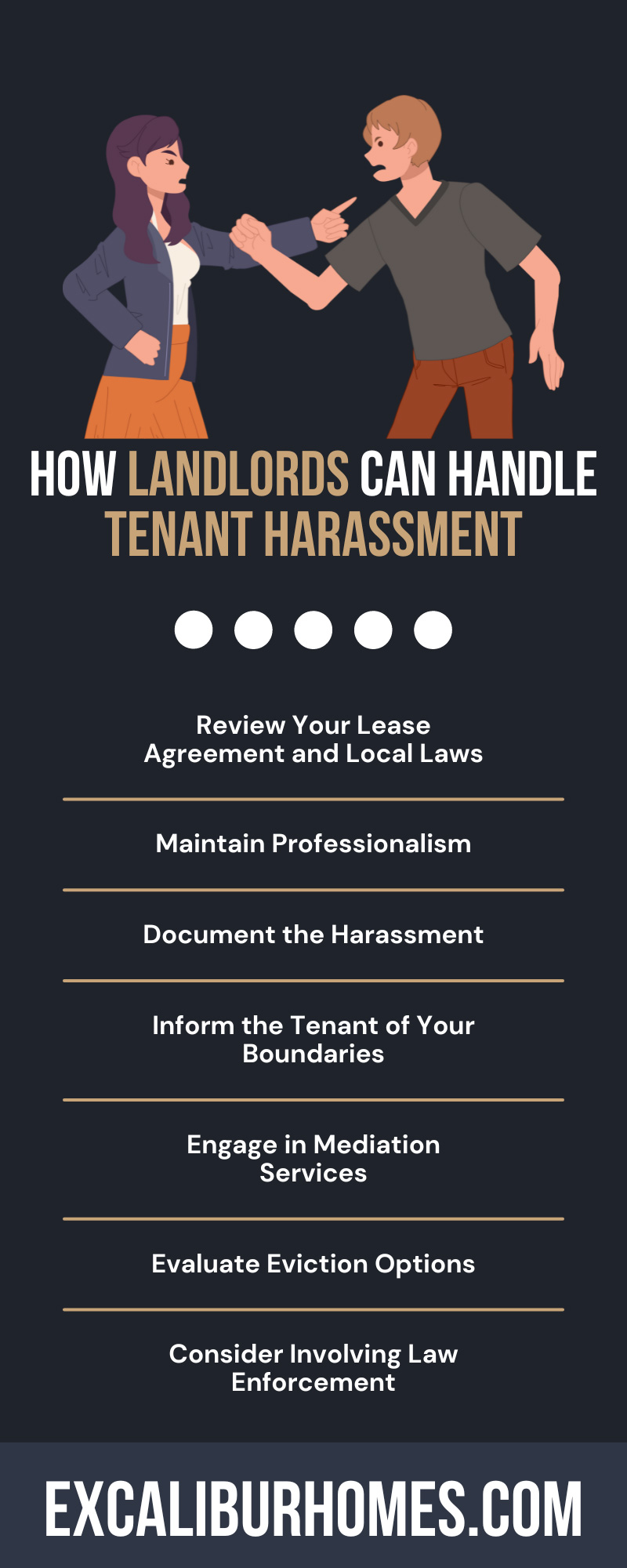
Every landlord wants a tenant who’s easy to deal with and respects their property. However, as is typical in the business of dealing with people, you’re going to encounter a range of colorful personalities.
As a result, you’ll likely deal with an unruly tenant or two, but what happens when unruly turns into disrespectful or when disrespectful turns into violence? If you’re a landlord dealing with a tenant who’s becoming more than a handful or makes you feel unsafe, here’s how you should handle tenant harassment.
Review Your Lease Agreement and Local Laws
The first step in addressing tenant harassment involves a thorough review of the lease agreement and an understanding of local laws governing landlord-tenant relationships. The lease agreement often contains specific clauses detailing the expected behavior of tenants, grounds for complaints, and the procedure for dealing with disputes on your end.
Being well-versed with these provisions allows landlords to identify breaches of contract quickly. Additionally, local laws offer a framework for the legal protections and obligations of both parties. These laws can vary significantly from one jurisdiction to another, making it imperative for landlords to know the regulations specific to their area.
Maintain Professionalism
In the face of tenant harassment, maintaining a professional demeanor is fundamental for landlords. This requires clear, calm, and direct communication and meticulously documenting all interactions with the tenant. Even if you feel threatened or disrespected, staying calm and not lashing out is key.
If you respond with violence or retaliate, you may find yourself in hot water as well, even if you were technically in the right. It can also dangerously escalate the situation or undermine your legal standing. Landlords should approach these situations with a problem-solving mindset, aiming to understand the tenant’s perspective while firmly conveying the unacceptable nature of their behavior based on the lease agreement and applicable laws.
Document the Harassment
Documenting the details of the incidents is one of the most important things a landlord can do when handling tenant harassment. Documenting instances of tenant harassment meticulously is crucial in building a case, should you need to pursue legal action or resolve the matter through other formal channels. This involves keeping a detailed log of all incidents, including dates, times, descriptions of the harassment, and any witnesses or evidence, such as photographs, emails, or text messages.
Additionally, landlords should encourage other tenants who may have witnessed harassment or dealt with it themselves to provide written statements detailing their experiences. This comprehensive documentation serves multiple purposes: offering a clear record of the tenant’s behavior, helping to establish patterns of harassment, and strengthening the landlord’s position in legal proceedings or mediation.
It’s not just about having evidence; it’s about having organized, dated, and verifiable evidence that clearly demonstrates the nature and extent of the harassment. Ultimately, this facilitates a faster and more effective resolution to the situation.
Inform the Tenant of Your Boundaries
Informing your tenant of your specific boundaries serves as a direct, professional confrontation of the harassment and demonstrates your commitment to maintaining a safe environment. Communicating these boundaries involves formally notifying the tenant of the specific behaviors that are unacceptable and the repercussions that will follow if such actions continue.
You should conduct this communication in writing and provide a physical record that professionals can refer to in future interactions or legal proceedings if necessary. The notice should outline the documented instances of harassment, reference the relevant sections of the lease agreement that prohibit such behavior, and state the potential consequences.
Engage in Mediation Services
Before resorting to legal action, you may want to consider the benefits of mediation services. Mediation offers a neutral ground where both landlord and tenant can discuss their issues with the guidance of an impartial third party. This process promotes open communication and mutual understanding and aims to reach an amicable resolution without entering the courtroom.
Landlords must select a mediation service that has experience with landlord-tenant disputes to ensure a fair and effective process. During mediation, be prepared to discuss the harassment issues in detail, offering evidence and examples while also being open to hearing the tenant’s side of the story. This approach can de-escalate tensions, fostering a solution that respects the rights and needs of both parties.
Evaluate Eviction Options
If communication and mediation don’t seem to work, or the behavior is too intolerable, you may need to start pursuing eviction options. Landlords must understand that eviction is a legal remedy usually reserved for the most severe cases of lease violations. This typically includes persistent harassment that significantly affects the quality of life for other tenants or the landlord.
However, before proceeding with eviction, you must ensure that all actions taken are in strict compliance with local landlord-tenant laws, which dictate the proper procedures for eviction. If you’re nervous about proceeding with this step, you should consult with a legal professional to review the documented evidence of harassment and assess the viability of eviction under the circumstances.
Consider Involving Law Enforcement
If you or another tenant are in immediate danger or are in fear of harm—whether it be to your person or property—you need to involve enforcement. When law enforcement arrives, you’ll need to provide them with detailed information regarding the harassment, including any documentation and evidence that you collected.
This not only aids in the proper handling of the situation by authorities but also ensures that there’s a legal record of the incidents. Honest and meticulous documentation can be crucial for any future legal actions or proceedings. Keep in mind that your primary responsibility is to maintain a safe living environment for all tenants, and involving law enforcement is a step that underscores this commitment.
If you’re tired of dealing with less-than-ideal tenants, want to spend more energy on other investments, or want more time to yourself, let the professionals at Excalibur Homes help. With an extensive list of property management services—from marketing to leasing and beyond—we have the tools and dedication to make the experience of landlordship easier for you.




